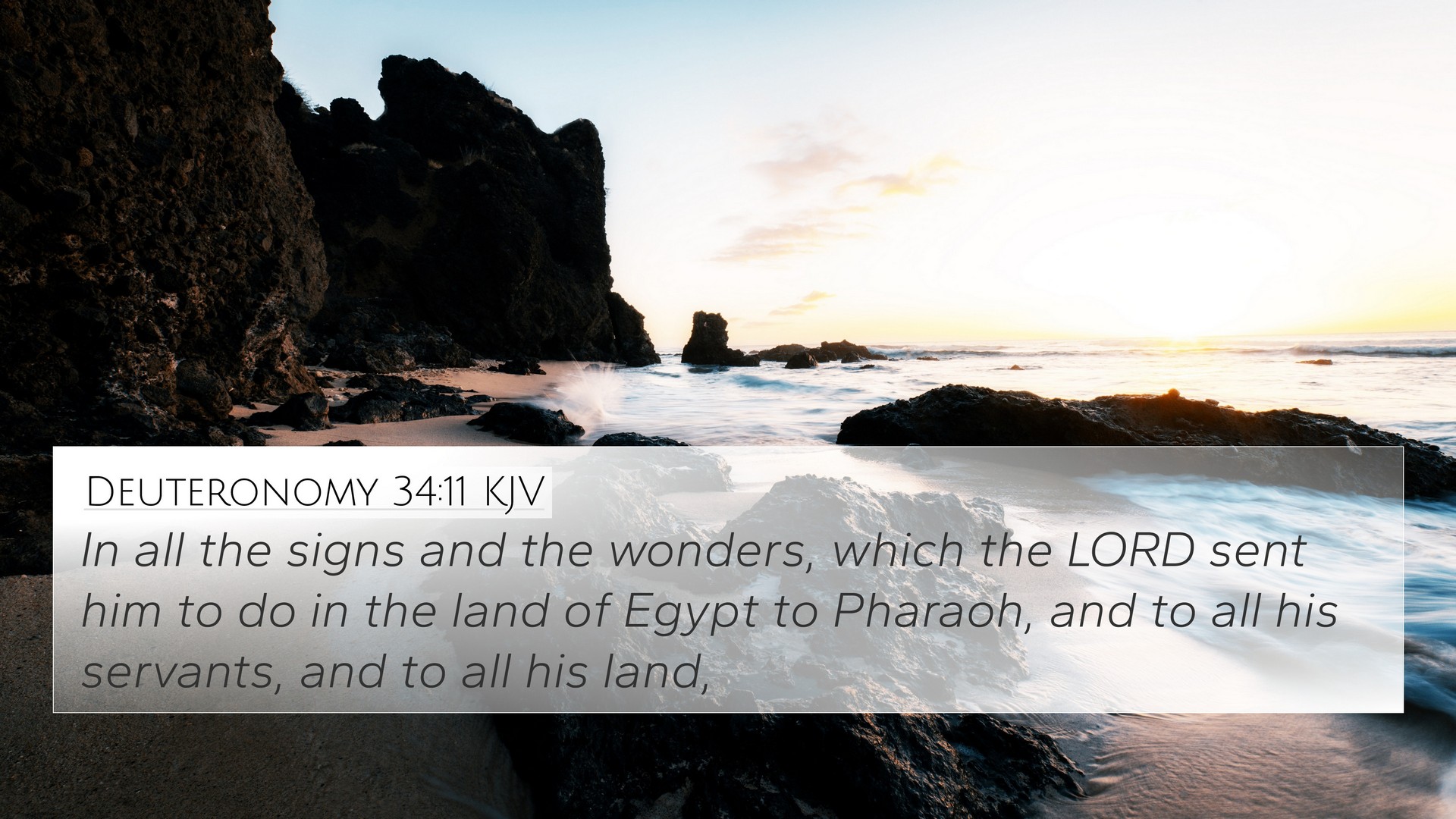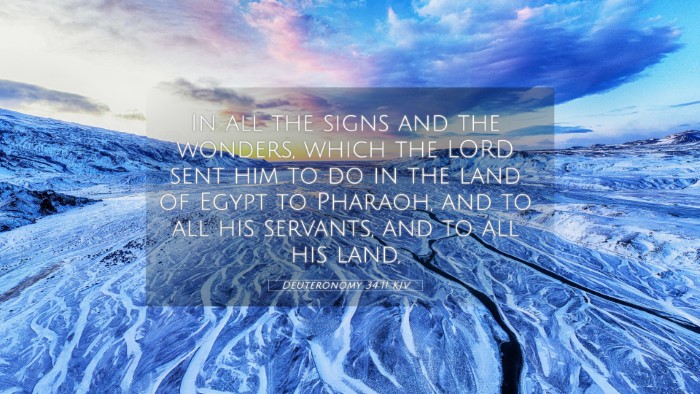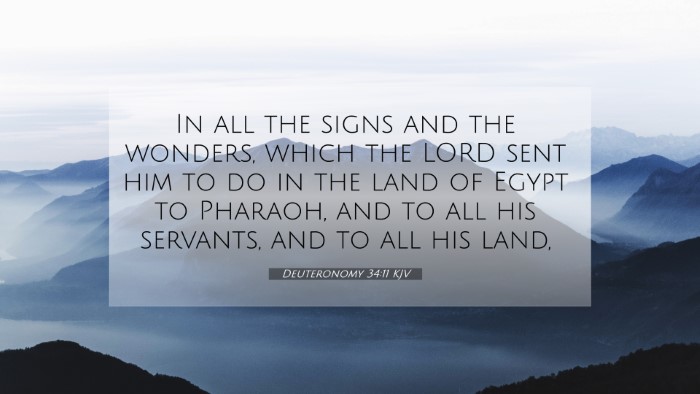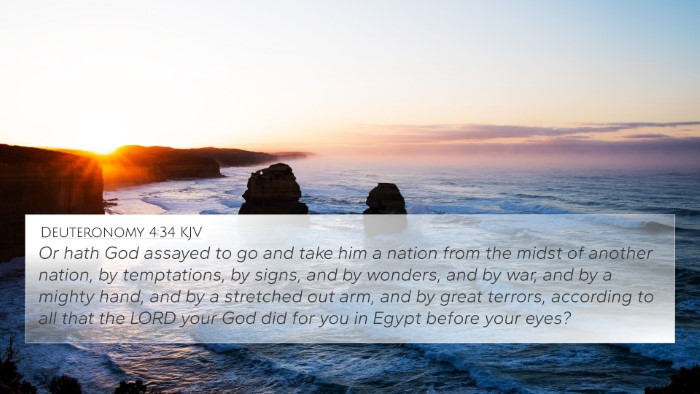Understanding Deuteronomy 34:11
Verse Reference: Deuteronomy 34:11 - "And in all the mighty hand, and in all the great terror which Moses shewed in the sight of all Israel."
Overview and Context
The conclusion of the Pentateuch presents the final moments of Moses, encapsulating his leadership and the divine authority that played a pivotal role in the Exodus narrative. Deuteronomy 34 marks the moment of transition from Moses’ leadership to that of Joshua, setting a tone for the future of Israel.
Insights from Public Domain Commentaries
Matthew Henry's Commentary
Matthew Henry emphasizes the significance of Moses’ legacy in Israel's history, particularly highlighting the ‘mighty hand’ of God displayed in the miracles performed through Moses. This verse serves to remind the Israelites of God's continued presence and power as they prepare to enter the Promised Land. Henry points out that Moses was not only a leader but also a mediator between God and His people, demonstrating how God's actions through him shaped the identity of the Israelites.
Albert Barnes' Notes
Albert Barnes focuses on the phrase “great terror” as indicative of the fear and reverence instilled in the people through the miraculous acts of Moses. He interprets this fear as central to the Israelites’ relationship with God, providing necessary respect for His power. Barnes also notes the importance of this fear being channelled into obedience and worship of the Lord, as the fear of God is the beginning of wisdom (Proverbs 9:10).
Adam Clarke's Commentary
Adam Clarke provides an interpretation that sees Moses as a quintessential figure of inspiration and divine authority. Clarke notes that the ‘mighty hand’ refers to God’s active involvement in the history of Israel, exemplified through Moses' leadership. He underscores the transformative journey of Israel, suggesting that recognition of God's power through Moses is crucial for the nation’s understanding of their covenant obligations.
Key Themes
- Divine Authority: The verse emphasizes God's active role in the events of Israel’s journey, showcasing that Moses’ authority is rooted in his divinely given capability.
- Fear and Reverence: It reflects the necessary fear that the Israelites must hold toward God, a theme prevalent throughout the Bible.
- Transition and Leadership: The transition from Moses to Joshua symbolizes a new era for Israel, emphasizing the continuity of God’s plan for His people.
- God's Miraculous Acts: The mention of the ‘mighty hand’ reflects a broader biblical theme of miracles that demonstrate God's power and involvement in human affairs.
Cross References
Understanding the connections between Bible verses enhances our study. Here are some critical cross-references related to Deuteronomy 34:11:
- Exodus 7:3-5 - God's promise to demonstrate His power through signs and wonders.
- Exodus 14:31 - The Israelites’ fear of God following the crossing of the Red Sea.
- Deuteronomy 10:21 - Moses' acknowledgment of God as the one who has done great things for Israel.
- Joshua 4:24 - The purpose of God's miracles, to instill fear and reverence in the hearts of the people.
- Psalms 77:14 - A reminder of God's strength and miracles among His people.
- Psalms 106:22 - God’s wonders performed in Egypt and the Red Sea.
- Acts 2:22 - Reference to God’s mighty works performed in Jesus, paralleling Moses' miracles.
Thematic Connections
When studying Deuteronomy 34:11, we see thematic connections with various biblical texts:
- Moses as a Mediator: Links with Hebrews 3:5, where Moses is described as a faithful servant in God's house.
- Significance of Fear: Relates to Philippians 2:12-13, where believers work out their salvation with fear and trembling.
- Divine Presence: Connects to Matthew 28:20, where Jesus assures His presence with the disciples.
- Miraculous Works: Reflected in John 14:12-14, discussing believers doing greater works through faith in Jesus.
Conclusion
Deuteronomy 34:11 not only serves as a historical summary of Moses' legacy but also invites believers today to recognize God's mighty hand in their lives. Through Moses, we see an archetype of leadership marked by divine empowerment and continuous call to humility and obedience before God.






